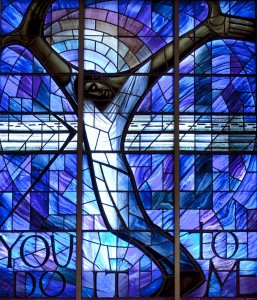by Nilwona Nowlin, Redemptive Artist
I’ve been on over 10 Sankofa Journeys, often multiple times in a year – and sometimes two in one month! (To learn more about why, read this.) As noble as that sounds, all those journeys are pointless if I haven’t learned from them. The next ECC Sankofa Journey is scheduled for July 27-30, 2017. Perhaps you are considering attending; or perhaps you are trying to encourage a friend, family member, or colleague to attend. I’d like to share some of what I’ve learned from my numerous Sankofa Journeys, in hopes that it will contribute to a more impactful experience for you.
Start early. If you’re new to this journey, consider engaging with resources on the LMDJ website before you get on the bus.
Sign up with a partner. When you sign up for Sankofa with a partner, it demonstrates that you are in this thing for the long haul. Whether you are white or a person of color, it means that you are committed to your relationship and willing to equip yourself to fight for it when you encounter the complicated roadblock of conflict rooted in ethnic/racial/cultural differences. If you don’t have an already existing cross racial relationship, you may have some work to do before getting on the bus. (See “start early.”)
Stick with your partner. I guarantee you, regardless of your ethnicity, there will be moments during the Sankofa Journey when you may consider looking up the closest Greyhound station and making a run for it. Okay, that’s a bit extreme; but there will be times when your level of pain will be so great that you will want to withdraw from your partner. Don’t. Take the time that you need to process – write or draw in your journal, pray, cry, do whatever you need to do. But don’t shut out your partner completely. Journeying through this pain together will bring you closer together.
Stay connected with your partner. One of the reasons that I’ve been on so many Sankofas is that there are often a lot of white participants who signed up without a partner. The problem with this is that it makes it easy for white participants to approach the experience as an oppression voyeur. Most of the people with whom I was partnered for Sankofa never followed up with me after we got off the bus. I’d be lying if I said I wasn’t bothered by this, but I also understand it. We had no relational commitment to each other, so it was easier for them to journey with me for a weekend and then mark it off of their “racial reconciliation champion” check list. Without a relationship, it’s easier for someone to go back to their hometown and/or church and talk about their moving experience of listening to a black person open old wounds, be vulnerable and share how they’ve been damaged by systemic and individual racism. Yet, they’ll never bother to connect with their partner again. Please don’t be that person.
#StayWoke. All you’ll want to do when you get off that bus is shower and get a good night’s sleep. Definitely do that, but also be intentional about processing your experience. In addition to regularly following up with your partner, make sure that you are continuing to do the work of bringing about racial justice. Take time to review the reflections you captured in your journal during the Journey, to keep you in touch with the feelings you experienced, and engage in some of the suggested “next step” activities you will receive in your participant packet. Last, but not least, continue to educate yourself and others on the issues.


